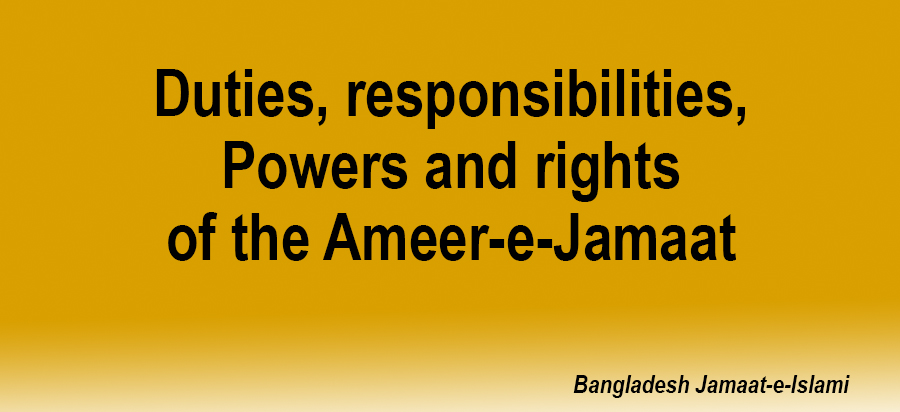
1. Responsibility
a) The prime responsibly to direct the Organization and movement of Jamaat shall be rested upon the Ameer-e-Jamaat. The Ameer-e-Jamaat will be held accountable to the Central Majlish-e-Shura and the National Council.
b) The Ameer-e-Jamaat shall determine the principles/strategies and give decisions in all important matters of Jamaat in consultation with the Central Majlish-e-Shura/Central Working Committee/Central Executive Committee.
2. Duty
a) The Ameer-e-Jamaat shall give priority to the submission to and carrying out of the order of Allah and the Prophet (peace be upon him) over everything.
b) He shall try heart and soul to achieve the aims and objectives of Bangladesh Jamaat-e-Islami and shall consider the same as his prime duty.
c) He shall give priority to the activities and interests of Jamaat over his own activities and personal interests.
d) He shall always settle any dispute arising between or among the members on the principle of impartiality, equity and justice.
e) He shall safeguard the amanat (trust property) of Jamaat in full.
f) He shall abide by the Constitution of Jamaat personally and shall accordingly endeavor to uphold and continue the organization and discipline.
g) He shall implement and supervise all the decisions of Jamaat-e-Islami.
3. Power and Right
a) The Ameer-e-Jamaat shall call in the sessions of National Council, Central Majlish-e- Shura, Central Working Committee and Central Executive Committee.
b) If any important decision on any important issue is required to be taken and if the session of Central Majlish-e-Shura or the Central Working Committee is not possible to call in, then steps shall be taken after consultation with those members of the Central Majlish-e-Shura or the Central Working Committee who are available on communication.
c) He will be entitled to appoint or terminate the Nayeb-e-Ameer, the Secretary General, the Assistant Secretary General and Departmental Secretary after consultation with the Central Majlish-e-Shura.
d) Being within the obligations imposed by the Central Majlish-e-Shura, he can spend or use the property and assets owned by Jamaat-e-Islami.
e) Can grant and terminate the membership (Rukoniat) of Jamaat.
f) Can suspend or terminate any subordinate organization.
g) Can spend money from the Baitulmal of Jamaat for the cause of Jamaat.
h) Can extend the period of Central Majlish-e-Shura for a period not exceeding three months if necessary. If special circumstance so demands, he can extend the tenure of the prevailing body of Majlish-e-Shura till the special circumstances comes to an end.
i) Can include any member, not being a member of Central Majlish-e-Shura, in the meeting of the Majlish on necessity.
j) Can impose restriction on the inclusion/presence of any member, not being a member of Central Majlish-e-Shura, in the meeting of the Majlish.
k) Can transfer a portion of his powers or rights to anyone else.
